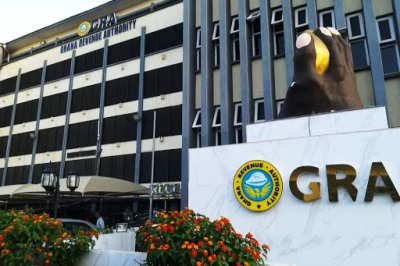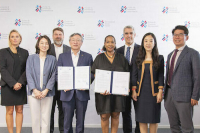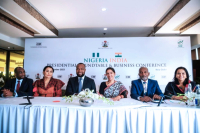
News (1796)
Mauritania, like several African countries, is stepping up efforts to develop entrepreneurship and support startups and SMEs. For more efficiency, the country needs a framework that will govern all of its actions.
On Saturday, September 9, the Mauritanian Parliament approved the Startup Act, the draft startup law in Mauritania, the Ministry of Digital Transformation announced this in a press release published by local media.
"The purpose of this law is to promote the creation and promotion of startups in Mauritania [by focusing on] creativity, innovation, the use of new technologies, the achievement of high added value as well as national and international competitiveness," the release informs.
The draft law was initiated by private and public stakeholders of the Mauritanian tech industry in March 2022. On September 7, 2023, it was presented to Ministers at the Ministerial Council held that day. The law is part of the Islamic Republic of Mauritania's overall strategy for the development of the digital economy and innovation. Its main objective is to define an incentive-based legal and institutional framework for the creation and development of young technology companies in Mauritania.
According to the country's authorities, the law includes provisions such as conditions for granting the startup label and support as well as conditions for access to tax, customs, and miscellaneous incentives to facilitate the installation and development of startups.
Once promulgated by the President of the Republic and implemented, the Startup Act should facilitate startups’ access to financing and investment, both locally and internationally. The aim is to label 300 startups over the next five years, support a dozen or so entrepreneurial support institutions –therefore helping create 3,000 direct jobs– and contribute to the digital economy at a rate of around 2.5 million MRU ($66,000) in sales per labeled startup.
Samira Njoya
Before Interswitch, Flutterwave, and Nala integrated this payment method developed by the American firm Alphabet.
Interswitch, a Nigerian financial technology startup, has integrated Google Pay into its Interswitch Payment Gateway (IPG) platform, according to a press release issued on Monday, September 11.
“Merchants can now store payment details within Google Wallet. This integration facilitates a smoother checkout process on the Interswitch platform, heightening the user experience. Additionally, the collaboration enables the acceptance of international cards on the Interswitch Payment Gateway, positioning businesses to seamlessly cater to a broader international clientele,” the release reads.
Interswitch, founded in 2002 by Mitchell Elegbe, became a unicorn in 2019 following the acquisition of 20% of its shares by US giant Visa. It has made a name for itself in the African fintech world, and during the COVID-19 pandemic, it proved to be the alternative of choice for commercial transactions in Nigeria and across the continent.
"By integrating Google Pay into our Payment Gateway, we are empowering businesses to harness the potential of a global customer base while ensuring secure and reliable payments," said Muyiwa Asagba, Managing Director of Digital Commerce and Merchant Acquisition at Interswitch.
Thanks to this integration, "users can simply add their debit and credit cards to the Google Wallet app and feel confident that their financial information is safe and secure when they’re making a purchase or catching a train," says Jenny Cheng, vice president and general manager of Google Wallet.
Adoni Conrad Quenum
Africa’s most valued startup (with $3 billion in estimated value) will now be able to offer major currencies like the US dollar, the Euro, and pound sterling to users in Nigeria.
On Monday, September 11, Nigerian unicorn Flutterwave announced the launch of a new solution called "Swap". Designed in partnership with Wema Bank and Kadavra BDC, and backed by the Central Bank of Nigeria (CBN), the Swap solution is billed as a secure and reliable digital platform that will give Nigerians immediate access to foreign currency at competitive exchange rates.
“At Flutterwave, our dedication to innovation is matched only by our commitment to simplifying financial processes for endless possibilities. Swap represents a significant leap forward in how Nigerians will engage with foreign exchange,” said Olugbenga Agboola (photo, left), co-founder and CEO of the unicorn.
Indeed, Nigeria has been facing several foreign exchange problems in recent years. One of these is a $10 billion foreign exchange backlog, which the CBN aims to resolve within the next two weeks. This backlog includes dollar claims from manufacturers, importers, business and personal travel allowances, as well as medical bills incurred abroad.
According to CBN Acting Governor Folashodun Shonubi, Swap will solve two critical problems plaguing Nigeria's foreign exchange market: the lack of synergy between financial institutions and a heavy reliance on cash transactions.
In the short term, Flutterwave will introduce a convenient card-issuing system for Swap users. The company plans to distribute over 10 million of these cards to Nigerians by October, enabling them to quickly resolve issues such as Personal Travel Allowance (PTA), and Business Travel Allowance (BTA) to facilitate their educational pursuits, commercial endeavors, and various travel requirements.
Samira Njoya
Numerous African governments are now recognizing digitization as a pivotal driver of development. Consequently, they are actively aiming to utilize this technology to expedite their countries' progress and enhance the welfare of their citizens.
On September 8, Ghana and the Republic of South Korea signed a $2.2 million grant to bolster domestic revenue collection. The agreement was signed in Accra by Mr. John Ampontuah Kumah, representing the Ghanaian government, and the Country Director of the Korea International Cooperation Agency (KOICA), Mr. Dong Hyun Lee.
The partnership aims to establish a comprehensive master plan to modernize Ghana's tax systems and integrate them into digital structures, including Mobile Money (MoMo) platforms. It will be executed by the Ministry of Finance and the Ghana Revenue Authority (GRA) and will focus on building the capacities of revenue and tax officials. In addition to capacity building, it will also involve consultations to expand the Value Added Tax and income tax bases using the MoMo transactions database and promote e-invoicing for increased transparency in cross-border commercial transactions.
The implementation of the master plan is expected to have a lasting positive impact on the livelihoods of Ghanaians and contribute to the long-term transformation of the national economy.
Speaking at the agreement signing ceremony, Mr. Kumah expressed confidence in the master plan's potential to broaden Ghana's tax base and boost domestic revenue mobilization. This partnership represents “the tangible efforts and collaboration between two nations to improve the lives of our citizens and contribute to the sustainable development of Ghana,” he said.
Mr. Dong Hyun Lee underscored the role of tax revenues in driving socio-economic development. In that regard, he emphasized the need for robust institutional frameworks to ensure the effective implementation of the master plan, which will be customized to meet Ghana’s unique requirements in collaboration between Korean and Ghanaian tax experts.
Hikmatu Bilali
Between September 4 and 7, We Are Tech carried out an online survey into how users feel about the ongoing digitization trend in Africa, their uses, and their expectations. This survey provides interesting insights.
We want an innovative administration!
Administration is the first sector in which We Are Tech Africa’s survey respondents expect the most innovations to facilitate their daily lives and improve governance in their countries. Their second concern is education. Then agriculture. Other sectors lag far behind.
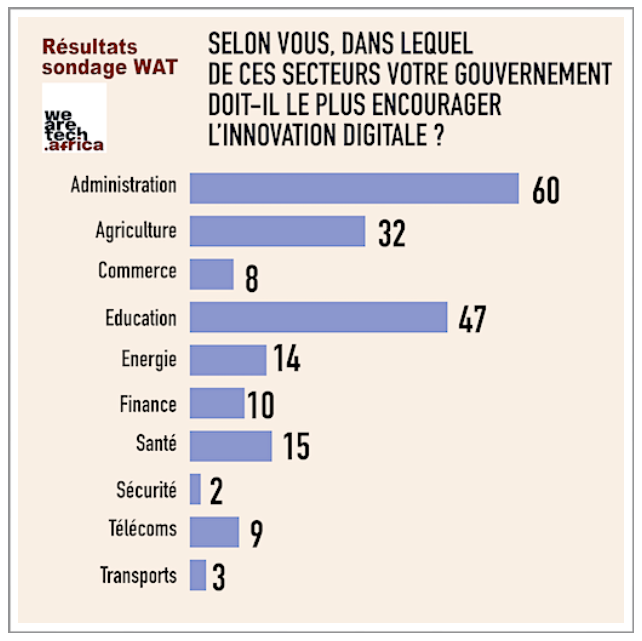
Evolving and diversified uses
When it comes to digital adoption, it's no surprise that social networks are the most widely used, followed by online media and financial services (mobile money and fintech). However, there has been a significant breakthrough in e-commerce, e-admin, e-education, and even artificial intelligence.
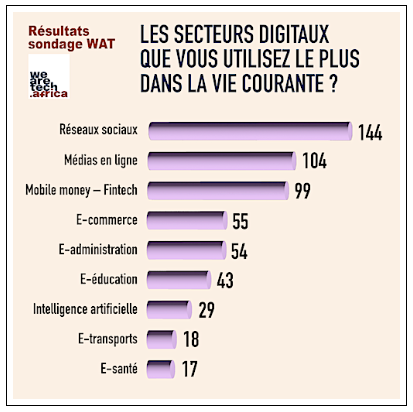
There are still obstacles to digitalization in Africa
According to respondents, the main obstacles to digitalization in Africa are high costs, poor connectivity, and a lack of promotion of new services.
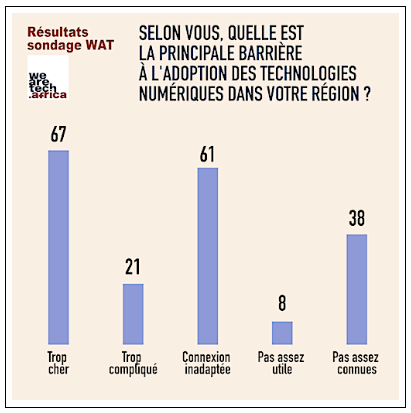
ChatGPT is getting into daily habits
Of the respondents, 39% claim to use the OpenAI service, while 8% even claim to use it daily.
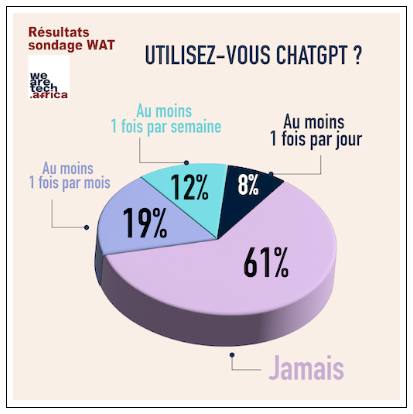
Cryptos remain attractive
While 63% of Internet users believe that cryptocurrencies are of no interest to them, 9% already own a wallet and 25% are considering opening one.

Greentech startups are rapidly emerging in Africa with firm conviction that new technologies will play a key role in supporting sustainable development on the continent.
Catalyst Fund, a private equity fund investing in early-stage, climate-focused startups in Africa, has reached the first closing of its $40 million fund. Last Wednesday, the fund announced a first closing, at $8.6 million, with support from investors like FSD Africa Investments (FSDAi), the Cisco Foundation, USAID (Prosper Africa), and technology investor Andrew Bredenkamp.
The Kenya-based fund, headed by French impact investor Maelis Carraro, plans to invest in around 40 start-ups, including 20 this year. Eligible companies will receive funding of up to $200,000 for pre-seed startups, $500,000 for seed-stage companies, and $1.5 million in Series A financing for more mature companies.
“By blending equity investments with hands-on venture building, we believe we can unlock tremendous potential for innovative companies on the continent. Supporting ventures at the pre-seed stage requires more than capital. Our venture builders are the engineers, data scientists, and growth marketing experts who can supercharge founders’ journeys toward building scalable and highly impactful ventures," says Maelis Carraro.
Climate change is a global reality but Africa is the continent most vulnerable to its adverse effects despite contributing just 3% of global carbon emissions. It is therefore important to invest in startups that are active in the fight against climate change on the continent. According to a report published, in February 2023, by technology business accelerator AfricArena, such startups raised a total of $1.17 billion in 2022, of which $863 million was invested in capital.
By strategically focusing on solutions in agri-tech and fisheries management, food systems, insurtech and climate fintech, cold chain, waste management, and water management, Catalyst Fund aims to accelerate sustainable green growth. It will focus on solutions that can enable communities to better prepare for and manage shocks, adapt livelihoods to climate impacts, and build long-term resilience.
Samira Njoya
Despite SMEs making up the majority of businesses in developing countries, their engagement in international trade is limited compared to their economic importance. However, the emergence of the digital economy could create new opportunities for SMEs to actively participate in global economic networks.
Korea Technopark Association (KTPA) and the International Trade Centre (ITC) have signed a Letter of Intent to drive the digital transformation of small and medium-sized enterprises (SMEs) in developing countries. The partnership was announced in a press release issued by the ITC on Tuesday, September 5. This strategic partnership, with an initial focus on Kenya, seeks to foster innovation, facilitate technology transfer, and enhance small business capabilities.
In response to the challenges posed by the fourth industrial revolution, this collaboration will leverage the 'Korea Technopark Operational Model' (K-TP Model), serving as an innovative ecosystem. The model will promote cooperation among government entities, industries, research institutions, and academia.
The Letter of Intent outlines various initiatives, including the establishment of Technoparks in developing countries, the strengthening of innovation and technology ecosystems, and the creation of connections between Korean organizations and businesses in these regions.
The primary objective of this partnership, supported by the Ministry of SMEs and Startups of the Republic of Korea, is to support the digital transformation of Kenyan manufacturing SMEs, thereby enhancing Kenya's industrial innovation.
Youngjib Kim, Chairman of the Korea Technopark Association, expressed enthusiasm for the partnership, highlighting KTPA's commitment to fostering innovative ecosystems for manufacturing SMEs in developing nations and contributing to the Sustainable Development Goals.
The collaboration between KTPA and ITC represents a significant step toward promoting technological advancement and economic growth in developing countries through targeted digital transformation initiatives for SMEs.
Hikmatu Bilali
Internet for all is a major development challenge for East African countries. Despite the ambitions stated in national development plans, several countries are struggling to provide better connectivity for their populations. Setting up a joint project could provide a solution to that challenge.
The East African Community (EAC) will be launching an Eastern Africa Regional Digital Integration Project (EA-RDIP 2023-2028) in the coming months. Daniel Murenzi, CAE's Senior ICT Officer, announced the 10th edition of the East African Internet Governance Forum (EA-IGF), held on Tuesday, September 5, in Kigali, Rwanda. The project aims to meet the connectivity needs of countries in the Horn of Africa.
"The Eastern Africa Regional Digital Integration Project is in response to the discussions and recommendations of the 9th East Africa Internet Governance Forum and aims to drive digital market integration by expanding broadband connectivity and improving the digital service environment," said Daniel Murenzi.
The five-year World Bank-backed project aligns with regional priorities, focusing on the need to bridge the digital divide, reduce connectivity costs, and empower marginalized groups such as youth, people with disabilities, and women. The aim is to boost access to broadband and digital services, fostering the development and integration of digital markets in East Africa.
To achieve this goal, the EAC relies on the Internet and partnerships between member states. Strategies will be put in place to ensure that Internet access is affordable for all. In January, East Africa boasted 23.1% Internet penetration, benefiting 110.7 million people, equivalent to 8.4% of its population.
Once implemented, the project will support cross-border connectivity, data harmonization, e-commerce regulations and policies, and the removal of trade barriers, to establish a single digital market.
Samira Njoya
Since 2011, Congo has been served by a single international fiber subsea cable, the WACS. Frequent outages on this infrastructure disrupt Internet services.
On Thursday, September 7, the Congolese Minister of Posts, Telecommunications and the Digital Economy, Léon-Juste Ibombo, launched the construction of a second national backbone network, resulting from Congo's recent connection to the new 2Africa subsea cable.
The 2Africa subsea cable, initiated by Meta (Facebook's parent company), will enable data transmission between Pointe-Noire and Brazzaville at a very high speed of up to 10 gigabytes per second.
According to the Minister of Telecoms, the new network will improve and further strengthen the capacity of what already exists. "The construction of the new Matombi backbone network, which will serve Pointe-Noire, Brazzaville, and the other cities, is the concrete expression of a strong ambition to improve the speed and reliability of electronic communications, facilitate trade and access to international markets, foster technological innovation and encourage the emergence of startups, and strengthen Congo's participation in the global digital economy," he said.
2Africa is the second international subsea cable the Republic of Congo is connected to. In 2011, the country connected to the WACS (West Africa Cable System) cable, on which it mainly depends for broadband Internet services. However, frequent outages on this infrastructure cause disruption to Internet services.
When completed in 2024, the 2Africa cable will be 45,000 km long, making it the longest in the world. It will serve a geographical area (Africa, Middle East, Europe) home to some three billion people, or 36% of the world's population.
In Congo, 2Africa should not only reduce the cost of Internet services but also extend access to these services to millions more people. According to the latest data from the regulator, the country currently has 3.05 million Internet users, equivalent to a penetration rate of 54%.
Samira Njoya
Nigeria aims to become one of the leaders in the African digital economy. To achieve its goal, it is signing partnerships with countries that share the same objectives.
Nigeria's Minister of Communication, Innovation, and Digital Economy, Bosun Tijani, signed two memorandums of understanding in New Delhi, India, last Wednesday. The first agreement, signed with the Indian Ministry of Electronics and Information Technology, aims to share the best digital solutions that would benefit citizens in both countries.
The second partnership, signed with the Central Square Foundation team, a non-profit organization working to ensure quality school education in India, aims to develop solutions that leverage technology to facilitate education in Nigeria.
“The collaboration between our countries gives us a platform to build on the upward trajectory of digital transformation as a driver of economic growth,” Dr. Bosun Tijani indicated in a post on X (formerly Twitter).
The MoU were signed on the sidelines of the 18th G20 Summit, to be held from Saturday, September 9 to Sunday, September 10 in New Delhi. They come at a time when the Nigerian government is stepping up efforts to attract additional investors to the country, increase funding to support Nigerian innovators and expand resources for local entrepreneurs. With such initiatives, the government wants to create one million jobs in the digital economy and improve digital literacy among the youth.
By choosing India to support those digital projects, Nigeria is making a strategic move. Indeed, in less than 10 years, India's digital penetration rate has more than doubled. In 2015, the world's fifth-largest economy launched "Digital India", an ambitious program to transform India into "a digital society and knowledge economy."
Samira Njoya
More...
With the acceleration of digital transformation across the continent, African countries are compelled to invest in cybersecurity. 18 of the continent's 54 countries have already drawn up national cybersecurity strategies, and 22 have national computer incident response teams (CIRTs).
The lack of investment and weak regulation exposes Africa to cyberattacks, according to the report "Cybersecurity in Africa- A Call to action" published in June 2023 by consulting firm Kearney. Yet investment in the African cybersecurity market is set to rise from $2.5 billion in 2020 to $3.7 billion in 2025, representing a compound annual growth rate of 7.9%.
"Despite this investment, it’s estimated the region loses more than $3.5 billion annually due to direct cyberattacks, and billions more from missed business opportunities caused by the resulting reputational damage from the attacks,” the report says.
To show the continent’s vulnerability to cyberattacks, Kearney tested its cyber resilience –the ability to resist, adapt, and recover from cyberattacks. That test focused on the five African best performers in the International Telecommunication Union's Global Cybersecurity Index: South Africa, Morocco, Nigeria, Kenya, and Egypt.
“Through the five selected countries, the analysis showed that Africa’s cyber resilience is low, particularly around strategy, governance and operational entities and cross-sector cooperation,” the report states.
While the average benchmark is 0.25% of GDP, South Africa, the African champion in cybersecurity spending, invests just 0.19% of its GDP, compared with 0.03% for the rest of sub-Saharan Africa. "If each African country spends 0.25 percent of GDP annually on cybersecurity, this would be in line with spending in mature markets. Our estimates suggest that this translates to $4.2 billion annually for the region," reads the document.
In addition to financial investment, investment in human capital is also an important component. Indeed, 84% of organizations believe that less than 50% of candidates applying for cybersecurity jobs are qualified, and more than half of companies seeking these profiles take more than 6 months to find qualified people.
Against this backdrop, in an interview with We Are Tech Africa last May, Youssef Mazouz, Secretary General of the African Cybersecurity Center, explained that there was a need to support Africa “by setting up continuous training, building skills, and opening cybersecurity research centers and universities."
Regulatory issues
African countries are yet to agree on regulations. Although the African Union convention on cybersecurity and the protection of personal data was adopted in 2014, it is not yet effective to this day. According to Article 36, to become effective, the convention must be ratified by at least 15 of the continent's 54 countries. To date, only 14 have ratified it, the latest being Côte d’Ivoire (March 2023). However, digital transformation has been accelerating on the continent since the Covid-19 pandemic.
“Cybersecurity is not a matter from which African countries can isolate themselves. The interconnectivity of systems results in the interconnectivity of the security threats to member states.[...] The absence of an implemented, unifying, regional governance framework makes it difficult to collaborate and share intelligence,” the report indicates.
Africa will better manage cybersecurity by emulating European countries, which opted for the General Data Protection Regulation (GDPR). That law, effective since May 2018, frames data processing equally throughout the European Union (EU).
Adoni Conrad Quenum
In recent years, Kenya has established itself as a leader in digital transformation on the African continent, with one of the most dynamic ICT ecosystems in the world.
In the coming months, Kenya will establish a Centre of Excellence for digital skilling of the public workforce. Indeed, on September 4, 2023, ICT Minister Eliud Owalo (photo, center), met with a delegation from the United Nations Development Program (UNDP) and Microsoft Corporation. During the meeting, the three parties “deliberated on the development” of that center whose aim is to equip civil servants with the digital skills required to reinforce digitization.
The center aligns with one of the objectives of Kenya’s Digital Master Plan 2022-2032. It is announced three months after the signing of a partnership between the Kenyan government and the UNDP. The partnership focuses on key areas essential to driving an inclusive digital transformation, including training and skills enhancement, data governance, e-government, jobs, and digital businesses.
Once developed, the center will improve public workers’ ability to use digital technology for the delivery of public services. The aim is to accelerate the digital transformation of the economy and significantly reduce unemployment. According to Accenture's Africa iGDP Forecast, by 2025, Kenya's digital sector will add KES 1,400 billion ($9.5 billion) or 9.24% to the country's GDP.
Samira Njoya
The entrepreneurial landscape in Africa is thriving, offering startups opportunities for funding and increased visibility. Africa's Business Heroes plays a pivotal role in achieving this objective by identifying entrepreneurs and actively supporting their growth journey.
Kigali recently hosted two days of intense competition among 20 African innovators at the Africa's Business Heroes (ABH) Semi-Finals. Three female-led startups stood out among the contest’s top 10 finalists, a significant achievement for gender diversity.
The three women are Bola Bardet (pictured) from Benin, Christina Gyisun from Ghana, and Nthabiseng Mosia from South Africa. They respectively operate in the healthcare, agriculture, and energy sectors.
Bola Bardet is the CEO and Co-Founder of Susu, a startup that revolutionizes healthcare by offering healthcare packages and insurance that diaspora Africans can finance for their relatives in three African countries - Cote d'Ivoire, Senegal, and Gabon.
Christina Gyisun is the CEO and Co-Founder of Sommalife Limited. Her company empowers smallholder farmers in Ghana through advanced software technology, connecting them to global food and cosmetic manufacturers.
Meanwhile, Nthabiseng Mosia is the CMO and Co-Founder of Easy Solar, a startup that provides financing for high-quality solar systems and appliances to those without grid access, with flexible payment options. Mosia operates Easy Solar in Sierra Leone.
These women join other finalists from Egypt, Kenya, Morocco, Nigeria, Rwanda, and South Africa, spanning diverse industries.
The top 10 finalists will compete for a share of $1.5 million at the ABH Grand Finale in Kigali in November. The winner gets $300,000, the first runner-up $250,000, and the second runner-up $150,000. The remaining seven finalists will each receive $100,000, with $100,000 for additional training programs.
Africa's Business Heroes (ABH) is the Jack Ma Foundation's program that aims to nurture African entrepreneurs. Launched in 2019, it identifies, trains, and provides grants to outstanding African entrepreneurs. Jack Ma, Founder of Alibaba Group and the Jack Ma Foundation, created the initiative after witnessing Africa's entrepreneurial potential during his 2017 visit.
“At ABH, we have long recognized the potential of entrepreneurs as engines of economic and social growth. Now in the fifth year of the competition, we are encouraged to see that ABH has grown into a truly pan-African initiative that is positively impacting the continent’s entrepreneurship landscape,” said Zahra Baitie-Boateng, ABH head of partnerships and programs.
As the ABH Grand Finale approaches, the world eagerly awaits the impactful solutions and innovative visions these finalists will present, shaping a brighter, more inclusive African business landscape.
Hikmatu Bilali
The debate on the impact of artificial intelligence on development in Africa gathered pace late last year. The opportunities and threats it represents are now being scrutinized by experts and organizations.
Artificial intelligence (AI) can be a formidable asset for international peace and security, according to the United Nations Development Program (UNDP). The UN body supports this position given the rapid pace at which conflicts are evolving, and the vast amount of data generated, which human beings are unable to process efficiently for effective decision-making processes.
The UNDP believes that "artificial intelligence can help us understand and even anticipate the onset and evolution of a crisis." But it must be combined with a human touch. Indeed, the international body is certain that Human-in-the-loop AI (HITL) –a process that combines the power of machine learning with human intelligence to solve complex problems– can improve data analysis in radically changing circumstances.
In Africa, where social networks have become privileged tools of expression, and where misinformation and hate speech are on the rise, as is communication from extremist groups, AI will help enhance watchfulness. Especially on platforms such as "Facebook and Twitter, which have been unwilling or unable to address these fundamental vulnerabilities," says the UNDP.
"These companies are often unable to consider the cross-platform impacts of their policies and user behaviors. They lack the resources (and internal incentives) to understand the impact of technology in a non-Western context and, to date, have been unwilling to share the metrics needed to properly assess the effects of their policies and interventions," laments the organization in the August 2023 issue of its "Development Futures Series".
After the start of the Ukrainian-Russian conflict on February 24, 2022, Twitter, YouTube, and Facebook were actively used to report on events in real-time. They were also used as “weapons” to influence and shape opinions online. However, they have also proved useful for studying many aspects of the conflict, such as attacks on health facilities, minefields, and the use of banned weapons systems (e.g. cluster munitions).
For the UNDP, artificial intelligence systems can be tested within the UN, in a small number of country offices, or in other field operations to meet the needs of each context. The initial objective could be to expand prevention efforts in places where tensions are rising or to identify disinformation campaigns targeting humanitarian personnel. These tests could lead to the creation of a cutting-edge global platform for sharing artificial intelligence tools, tags, models, and algorithms.
Muriel Edjo





